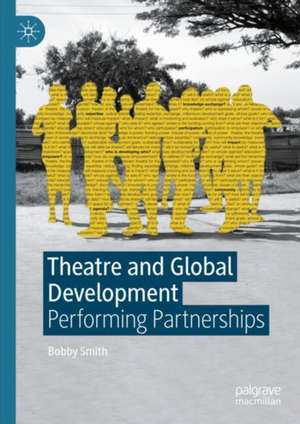Theatre and Global Development: Performing Partnerships
Autor Bobby Smithen Limba Engleză Hardback – 12 mai 2024
This is the first book to examine theatre and global development partnerships. It focusses on the UK and East African countries of Kenya, Rwanda and Uganda, presenting the author’s own experiences, case study analyses and perspectives from practitioners and scholars involved in theatre and development. It argues that simplistic binaries pervade partnerships, whereby the global North is regarded as ‘modern’ and ‘developed’ versus the ‘under-developed’ global South. This results in unequal power relations between collaborators, less effective projects with communities, and a lack of reciprocity and mutual benefit. Consequently, this book revitalises how we conceptualise partnerships. Issues such as widening inequalities, conflict, health and the climate crisis impact all countries. How, then, can we work across borders to support interconnected learning and action on these challenges? In this regard, principles of solidarity and mutual responsibility, as well as critical openness, enable us to reflect honestly about the failures of the partnerships we participate in and move beyond simplistic binaries of global North and South. The book is of importance to applied and socially engaged performance scholars and practitioners, and to development workers interested in arts and social change.
Preț: 728.28 lei
Preț vechi: 888.14 lei
-18% Nou
Puncte Express: 1092
Preț estimativ în valută:
139.38€ • 144.97$ • 115.06£
139.38€ • 144.97$ • 115.06£
Carte tipărită la comandă
Livrare economică 14-28 aprilie
Preluare comenzi: 021 569.72.76
Specificații
ISBN-13: 9783031557248
ISBN-10: 3031557247
Pagini: 272
Ilustrații: XVII, 239 p. 5 illus.
Dimensiuni: 148 x 210 mm
Greutate: 0.46 kg
Ediția:2024
Editura: Springer International Publishing
Colecția Palgrave Macmillan
Locul publicării:Cham, Switzerland
ISBN-10: 3031557247
Pagini: 272
Ilustrații: XVII, 239 p. 5 illus.
Dimensiuni: 148 x 210 mm
Greutate: 0.46 kg
Ediția:2024
Editura: Springer International Publishing
Colecția Palgrave Macmillan
Locul publicării:Cham, Switzerland
Cuprins
1. Introduction.-2. Theatre, development, and the problems with partnership.-3. How money shapes partnerships.-4. Navigating expertise.-5. Temporalities and spatialities of partnerships.-6.Theatre and development in the pluriverse / Disrupting the sensible.-7. Conclusion
Notă biografică
Bobby Smith is Associate Professor of Theatre and Performance Studies and course director of the MA Applied Theatre at the University of Warwick, UK. Through his research, creative practice and teaching he aims to develop innovative approaches to activism, education, and social change. He has worked internationally to explore issues including violence prevention, health education, peacebuilding and the climate crisis.
Textul de pe ultima copertă
How do theatre and development partnerships operate? What issues impede collaborations between various institutions and individuals? Why do relations between global North and South partners often fail to reflect important values such as equality, reciprocity and mutual benefit?
This is the first book to examine theatre and global development partnerships. It focusses on the UK and East African countries of Kenya, Rwanda and Uganda, presenting the author’s own experiences, case study analyses and perspectives from practitioners and scholars involved in theatre and development. It argues that simplistic binaries pervade partnerships, whereby the global North is regarded as ‘modern’ and ‘developed’ versus the ‘under-developed’ global South. This results in unequal power relations between collaborators, less effective projects with communities, and a lack of reciprocity and mutual benefit. Consequently, this book revitalises how we conceptualise partnerships. Issues such as widening inequalities, conflict, health and the climate crisis impact all countries. How, then, can we work across borders to support interconnected learning and action on these challenges? In this regard, principles of solidarity and mutual responsibility, as well as critical openness, enable us to reflect honestly about the failures of the partnerships we participate in and move beyond simplistic binaries of global North and South. The book is of importance to applied and socially engaged performance scholars and practitioners, and to development workers interested in arts and social change.
This is the first book to examine theatre and global development partnerships. It focusses on the UK and East African countries of Kenya, Rwanda and Uganda, presenting the author’s own experiences, case study analyses and perspectives from practitioners and scholars involved in theatre and development. It argues that simplistic binaries pervade partnerships, whereby the global North is regarded as ‘modern’ and ‘developed’ versus the ‘under-developed’ global South. This results in unequal power relations between collaborators, less effective projects with communities, and a lack of reciprocity and mutual benefit. Consequently, this book revitalises how we conceptualise partnerships. Issues such as widening inequalities, conflict, health and the climate crisis impact all countries. How, then, can we work across borders to support interconnected learning and action on these challenges? In this regard, principles of solidarity and mutual responsibility, as well as critical openness, enable us to reflect honestly about the failures of the partnerships we participate in and move beyond simplistic binaries of global North and South. The book is of importance to applied and socially engaged performance scholars and practitioners, and to development workers interested in arts and social change.
Bobby Smith is Associate Professor of Theatre and Performance Studies and course director of the MA Applied Theatre at the University of Warwick, UK. Through his research, creative practice and teaching he aims to develop innovative approaches to activism, education, and social change. He has worked internationally to explore issues including violence prevention, health education, peacebuilding and the climate crisis.
Caracteristici
First book-length study of theatre and development partnerships Draws on current theory Rooted in practice
